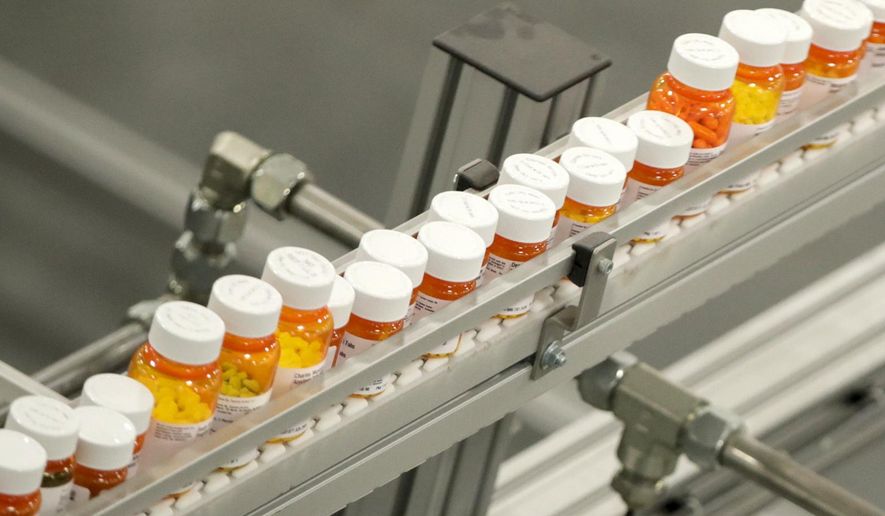The primary manufacturers of all 10 drugs targeted by President Biden as too costly will participate in the first-ever round of Medicare price negotiations, the White House said Tuesday.
Drugmakers had until the start of October to decide whether they would participate in the negotiation program established by Mr. Biden’s signature tax-and-climate legislation in 2022. The companies likely felt they had no choice; the alternative would be to pull out of Medicare.
“They’re taking steps to participate in the negotiating program so we can give seniors the best possible deal,” Mr. Biden said in an online video announcing their participation.
The White House said makers of some of the costliest and most commonly used prescription drugs for arthritis, diabetes, Crohn’s disease and cancer agreed to participate in negotiations after a legal challenge fell short last week.
U.S. District Judge Michael Newman of the Southern District of Ohio, an appointee of former President Donald Trump, denied the preliminary injunction sought by the U.S. Chamber of Commerce against the program.
The plaintiffs “have demonstrated neither a strong likelihood of success nor irreparable harm,” Judge Newman wrote.
He did not dismiss the case entirely. Other lawsuits also are wending their way through the courts.
The pharmaceutical industry and many congressional Republicans say the Medicare negotiation program amounts to government price-setting and will make it harder to discover new cures.
The U.S. Chamber of Commerce said it is reviewing the recent court ruling “and considering our options for next steps.”
“The U.S. Chamber supports access to affordable health care. However, the price controls that we are challenging would reduce access to new medicines Americans are counting on to save and improve their lives and would set a very devastating precedent for all U.S. businesses,” said Neil Bradley, executive vice president and chief policy officer at the Chamber.
A key lobbying group, the Pharmaceutical Research and Manufacturers of America, said the Biden administration is “attempting to take a victory lap on companies being coerced into an ’agreement’ they couldn’t refuse.”
“We’ve long supported changes that would lower costs for patients at the pharmacy, including a cap on out-of-pocket costs for Medicare Part D beneficiaries,” said Alex Schriver, the senior vice president of public affairs at PhRMA. “However, we won’t support a government price-setting scheme that allows a single agency to dictate the price of medicines and what future treatments and cures are worth developing.”
Mr. Biden and his allies say allowing Medicare to negotiate down the price of drugs is a commonsense way to put patients over profits.
Millions of seniors on Medicare take the selected drugs, which have limited competition and drive a large share of federal spending in the prescription drug benefit program known as Part D.
Under the program, the first round of negotiated prices will take effect in 2026. Pricing talks will occur this year and into next year, with the final prices published in the fall of 2024 — right before the presidential election.
Additional drugs from Medicare Part D and the doctor-administered Part B program will be selected in subsequent years.
Chiquita Brooks-LaSure, the Centers for Medicare and Medicaid Services administrator, said her agency would negotiate “in good faith consistent with the requirements of the law on behalf of people with Medicare.”
The Congressional Budget Office estimates the drug-negotiation program will save taxpayers $100 billion through 2031 while modestly curtailing the share of new drugs coming to market by around 1%.
Promoters of the program say it will reduce seniors’ out-of-pocket costs and could spill over into negotiations between employer plans and drugmakers, though it is unclear if that will happen.
The drugs selected in the first round were Eliquis by Bristol Myers Squibb, Jardiance by Boehringer Ingelheim, Xarelto by Janssen Pharmaceuticals, Januvia by Merck, Farxiga by AstraZeneca, Entresto by Novartis; Enbrel by Immunex Corp., Imbruvica by Pharmacyclics LLC, Stelara by Janssen Biotech and a series of insulins made by Novo Nordisk: Fiasp, Fiasp FlexTouch, Fiasp Penfill, NovoLog, NovoLog FlexPen and NovoLog Penfill.
Mr. Biden’s presidential campaign seized on Tuesday’s announcement by releasing an ad that touts his administration as a champion for the middle class and lower costs. Concerns about inflation and the rising cost of common goods have dogged Mr. Biden throughout his term.
“Whether it’s taking on Big Pharma to cut prescription drug costs, lowering health care premiums for millions of Americans, or reducing energy bills for American families, fighting for the middle class isn’t an empty campaign promise for Joe Biden and Kamala Harris — it’s their political DNA,” said campaign manager Julie Chavez Rodriguez.
• Tom Howell Jr. can be reached at thowell@washingtontimes.com.




Please read our comment policy before commenting.